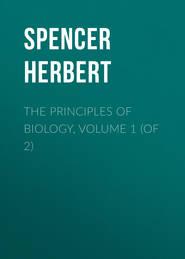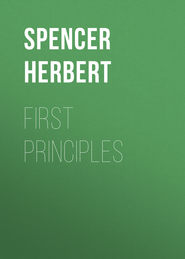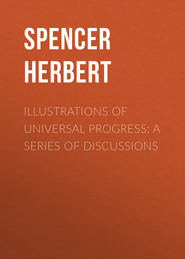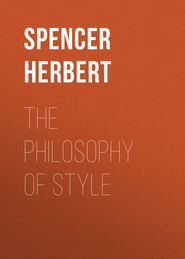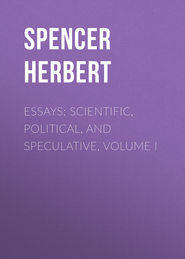По всем вопросам обращайтесь на: info@litportal.ru
(©) 2003-2024.
✖
Essays: Scientific, Political, and Speculative, Volume II
Настройки чтения
Размер шрифта
Высота строк
Поля
If I am asked why here I used the phrase “states of consciousness” rather than “manifestations of existence,” though I had previously preferred the last to the first, I give as my reason the desire to maintain continuity of language with the preceding chapter, “The Dynamics of Consciousness.” In that chapter an examination of consciousness had been made with the view of ascertaining what principle of cohesion determines our beliefs, as preliminary to observing how this principle operates in establishing the beliefs in subject and object. But on proceeding to do this, the phrase “state of consciousness” was supposed, like the phrase “manifestation of existence,” not to be used as anything more than a name by which to distinguish this or that form of being, as an undeveloped receptivity would become aware of it, while yet self and not-self were undistinguished.
43
Contemporary Review , December, 1877, pp. 49, 50.
44
Contemporary Review , March, 1878, p. 753.
45
Ibid. , March, 1878, p. 755.
46
Contemporary Review , December, 1877, p. 44.
47
Ibid. , December, 1877, p. 44.
48
Ibid. , March, 1878, p. 745.
49
Ibid. , January, 1881, p. 115.
50
Properly the term “simile” is applicable only to the entire figure, including the two things compared and the comparison drawn between them. But as there exists no name for the illustrative member of the figure, there seems no alternative but to employ “simile” to express this also. The context will in each case show in which sense the word is used.
51
A parallel fact, further elucidating this, is supplied by a locomotive engine. On looking at the driving wheel, there will be found, besides the boss to which the connecting rod is attached, a corresponding mass of metal on the opposite side of the wheel, and equidistant from the centre; or, if the engine be one having inside cylinders, then, on looking between the spokes of the driving-wheel, it will be seen that against each crank is a block of iron, similar to it in size, but projecting from the axle in the reverse direction. Evidently, being placed on opposite sides of the centre of motion, each crank and its counterbalance move in opposite directions relatively to the axle; and by so doing, neutralize each other’s perturbing effects, and permit a smooth rotation. This relationship which exists between the motions of the counterbalance and the crank, is analogous to that which exists between the motions of the arms and legs in walking; and in the early days of railway-locomotion, before these counterbalance weights were used, locomotive driving-wheels were subject to violent oscillations, analogous to those jerkings of the shoulders which arise when we walk fast without moving our arms.
52
Those who seek information on this point may find it in an interesting tract by Mr. Alexander Bain, on Animal Instinct and Intelligence.
53
The Music of the Most Ancient Nations, &c. , by Carl Engel. This quotation is not contained in my essay as originally published, nor in the version of it first reproduced in 1858. Herr Engel’s work was issued in 1864, seven years after the date of the essay.
54
It is far more probable that the ascents and descents made by this gibbon consisted of indefinitely-slurred tones. To suppose that each was a series of definite semi-tones strains belief to breaking point; considering that among human beings the great majority, even of those who have good ears, are unable to go up or down the chromatic scale without being taught to do so. The achievement is one requiring considerable practice; and that such an achievement should be spontaneous on the part of a monkey is incredible.
55
After the above paragraphs had been sent to the printers I received from an American anthropologist, the Rev. Owen Dorsey, some essays containing kindred evidence. Of over three dozen songs and chants of the Omaha, Ponka, and other Indians, in some cases given with music and in other cases without, there are but five which have any reference to amatory feeling; and while in these the expression of amatory feeling comes from women, nothing more than derision of them comes from men.
56
For numerous illustrations see essay on “The Origin and Function of Music.”
43
Contemporary Review , December, 1877, pp. 49, 50.
44
Contemporary Review , March, 1878, p. 753.
45
Ibid. , March, 1878, p. 755.
46
Contemporary Review , December, 1877, p. 44.
47
Ibid. , December, 1877, p. 44.
48
Ibid. , March, 1878, p. 745.
49
Ibid. , January, 1881, p. 115.
50
Properly the term “simile” is applicable only to the entire figure, including the two things compared and the comparison drawn between them. But as there exists no name for the illustrative member of the figure, there seems no alternative but to employ “simile” to express this also. The context will in each case show in which sense the word is used.
51
A parallel fact, further elucidating this, is supplied by a locomotive engine. On looking at the driving wheel, there will be found, besides the boss to which the connecting rod is attached, a corresponding mass of metal on the opposite side of the wheel, and equidistant from the centre; or, if the engine be one having inside cylinders, then, on looking between the spokes of the driving-wheel, it will be seen that against each crank is a block of iron, similar to it in size, but projecting from the axle in the reverse direction. Evidently, being placed on opposite sides of the centre of motion, each crank and its counterbalance move in opposite directions relatively to the axle; and by so doing, neutralize each other’s perturbing effects, and permit a smooth rotation. This relationship which exists between the motions of the counterbalance and the crank, is analogous to that which exists between the motions of the arms and legs in walking; and in the early days of railway-locomotion, before these counterbalance weights were used, locomotive driving-wheels were subject to violent oscillations, analogous to those jerkings of the shoulders which arise when we walk fast without moving our arms.
52
Those who seek information on this point may find it in an interesting tract by Mr. Alexander Bain, on Animal Instinct and Intelligence.
53
The Music of the Most Ancient Nations, &c. , by Carl Engel. This quotation is not contained in my essay as originally published, nor in the version of it first reproduced in 1858. Herr Engel’s work was issued in 1864, seven years after the date of the essay.
54
It is far more probable that the ascents and descents made by this gibbon consisted of indefinitely-slurred tones. To suppose that each was a series of definite semi-tones strains belief to breaking point; considering that among human beings the great majority, even of those who have good ears, are unable to go up or down the chromatic scale without being taught to do so. The achievement is one requiring considerable practice; and that such an achievement should be spontaneous on the part of a monkey is incredible.
55
After the above paragraphs had been sent to the printers I received from an American anthropologist, the Rev. Owen Dorsey, some essays containing kindred evidence. Of over three dozen songs and chants of the Omaha, Ponka, and other Indians, in some cases given with music and in other cases without, there are but five which have any reference to amatory feeling; and while in these the expression of amatory feeling comes from women, nothing more than derision of them comes from men.
56
For numerous illustrations see essay on “The Origin and Function of Music.”






